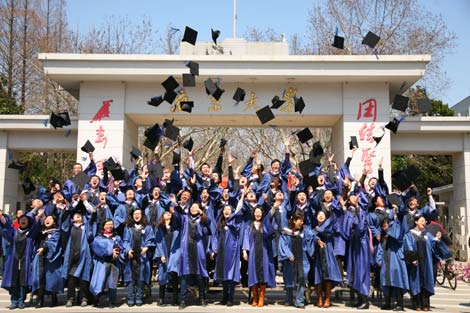System to offer accreditation for MBA programs
Updated: 2012-07-17 11:28
By Cheng Yingqi and Lan Lan (China Daily)
|
||||||||
 |
|
Master's of Business Administration graduates celebrate in front of the gate of Nanjing University in Nanjing, Jiangsu province, in March. To ensure the education represented by the degrees retains its high standard, China plans to introduce a system for granting accreditation to schools that offer MBAs. Nine business schools have already applied for the distinction. [Photo / China Daily] |
In China, few things are regarded as being both so practical and useless, so admirable and contemptible, and as being both the key to success and the beginning of a boring life, as a master's degree in business administration.
But to ensure that the degrees represent an education of the highest possible quality, authorities now plan to adopt a system to accredit schools that offer MBAs. Those who will oversee it said nine business and management schools have already applied for the distinction.
MBA degrees are now being offered in 233 business and management schools on the mainland. So far, though, only a dozen or so Chinese business schools have obtained the blessings of two global organizations that specialize in accrediting such programs.
The quality of Chinese MBAs was called into question in September 2011 in a series of critiques published by the newspaper Guangming Daily. They accused business schools of charging students too much, adhering to poor recruitment standards and doing little more than being social clubs for the rich.
Two months later, the China National MBA Education Supervisory Committee, an organization overseen by the Ministry of Education and the State Council's Academic Degrees Committee, announced that it would introduce an accreditation system in 2012.
Tong Yunhuan, secretary-general of the supervisory committee, said: "To start with, we are planning to work with the first group of nine universities and to proceed from there to establish a Chinese MBA accreditation system."
The goal of the system, he said, will be to establish "a long-lasting, scientific mechanism to improve the educational quality of MBA programs".
MBA programs first came to the Chinese mainland in 1991, when 94 candidates for the degrees were recruited. Two decades later, nearly 200,000 people have obtained an MBA.
"With improvements in the quality of education, some business schools have attained world-level accreditation," Tong said.
But among the schools that offer MBAs, "there is still a considerable difference" between the world-class institutions and those that are not in their league, Tong said.
John Quelch, vice-president and dean of the China-Europe International Business School, expressed willingness to help the country establish an accreditation system.
A good system, he said, can help promote high-quality programs that will guide students toward making wise choices and prevent them from wasting time and money on obtaining credentials of dubious value.
Quelch said it's less important to develop an accreditation system that includes some schools and excludes others. He said quality can be best controlled with the use of a three-level system that will allow colleges that offer the basics to receive at least stage-one recognition and to start on a path toward obtaining full stage-three accreditation.
"It is the responsibility (of China-Europe International Business School) to contribute to framing the domestic MBA accreditation standards," he said. "We stand ready to assist the Ministry of Education if called on to do so."

 Relief reaches isolated village
Relief reaches isolated village
 Rainfall poses new threats to quake-hit region
Rainfall poses new threats to quake-hit region
 Funerals begin for Boston bombing victims
Funerals begin for Boston bombing victims
 Quake takeaway from China's Air Force
Quake takeaway from China's Air Force
 Obama celebrates young inventors at science fair
Obama celebrates young inventors at science fair
 Earth Day marked around the world
Earth Day marked around the world
 Volunteer team helping students find sense of normalcy
Volunteer team helping students find sense of normalcy
 Ethnic groups quick to join rescue efforts
Ethnic groups quick to join rescue efforts
Most Viewed
Editor's Picks

|

|

|

|

|

|
Today's Top News
Health new priority for quake zone
Xi meets US top military officer
Japan's boats driven out of Diaoyu
China mulls online shopping legislation
Bird flu death toll rises to 22
Putin appoints new ambassador to China
Japanese ships blocked from Diaoyu Islands
Inspired by Guan, more Chinese pick up golf
US Weekly

|

|






